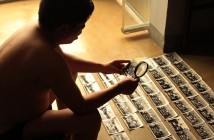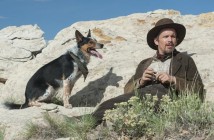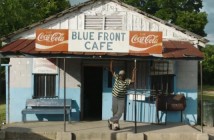Editor’s Notes: The following interview is part of our coverage of the Toronto International Film Festival. For more information visit tiff.net and follow TIFF on Twitter at @TIFF_NET.
Thomas Stuber’s A Heavy Heart is the complex story of a former boxer turned teacher and bouncer whose life takes a sudden turn for the worse. In many ways, it’s both a gritty and an uplifting film at that. Thomas Stuber’s feature debut is deservedly garnering a lot of talk at this year’s film festival. Peter Kurth’s portrayal of a deteriorating Herbert is a tour de force that showcases the great talent of his long theatrical background.
The recently took some time out of their busy festival schedule to have a chat with Next Projection.
Jacqueline: How did the idea for this film come onto your radar?
Thomas Stuber: It was sent to me by my producer. We did some rewriting which was a process of almost a year. Then we started on the casting process which was pretty tough.
Jacqueline: What do you mean by tough?
Thomas Stuber: It’s not easy to find a man who could play the main role. Together with my casting director, I searched all of Germany for a man who had this stature and this physique. I was looking for non-actors as well as actors. I found a few non-actors, but pretty soon realized that this wasn’t going to be the way. We needed a professional that could fill the demands of the story. That’s when Peter came up and I knew he was the right guy.
Jacqueline: What kind of research did you do to prepare for the role?
Peter Kurth: Physically I prepared for a couple of months with a personal boxing trainer to gain weight and build up the muscles for this role. It was a lot of work physically. I met up with someone who has ALS in a quite advanced stage and they were very helpful in helping me portray this role as best I could. They were very open and provided a lot of feedback to mentally prepare for this role.
Jacqueline: Is there anything you discovered about yourself in portraying Herbert?
Peter Kurth: Of course, every role teaches you something new or you find something different about yourself as an actor. However, with this role I found out that yeah, we’re all going to die at some point, but this disease speeds up the process. It was very special experience to go through.
Jacqueline: Do you still teach acting?
Peter Kurth: I used to! My schedule doesn’t allow for it anymore though.
Jacqueline: How was it working with Thomas?
Peter Kurth: * humorously feigns disdain *
Jacqueline: * laughs *
Thomas Stuber: * laughs * Should I leave now?
Peter Kurth: * laughs * Art has to deal a lot with luck. Us meeting was in a special place in time. We were both lucky to have met to start this process of making this film together. We could rely a lot on each other. We both took a lot of work from the other. It was a very good relationship and a great experience.
Jacqueline: You chose some interesting tones in the lens of the film. There were symbolic reds and greens…
Thomas Stuber: There is an overall atmosphere I was aiming to capture. The symbols are in its nuances. I mean, it’s always very important for our cinematographer’s work (Peter Matjasko). We have this dark tank of a character that doesn’t let emotions out or let anyone into his heart. The fate that he encounters makes him open up. It opens up light and sensitivity in his heart. The worse his physical condition gets, the more light is in his heart and in the film. In my eyes, it gets lighter, at least, that’s my intention. He sees the little things that we overlook everyday because he’s slowing down while the world is speeding up. He grows that way.
Jacqueline: What appeals to you in dark and gritty stories like this? (Stuber’s short film Of Dogs and Horses is about a homeless man who gambles everything for the life of his dog)
Thomas Stuber: I look for outsiders. Sometimes I’m not interested in the middle of society. I like people on the edge of society. They don’t have much luck in their lives and have to fight everyday for a chance at luck. Mostly they don’t achieve it. It’s tragic and it makes little men grow and create big tragic figures that appeal.




